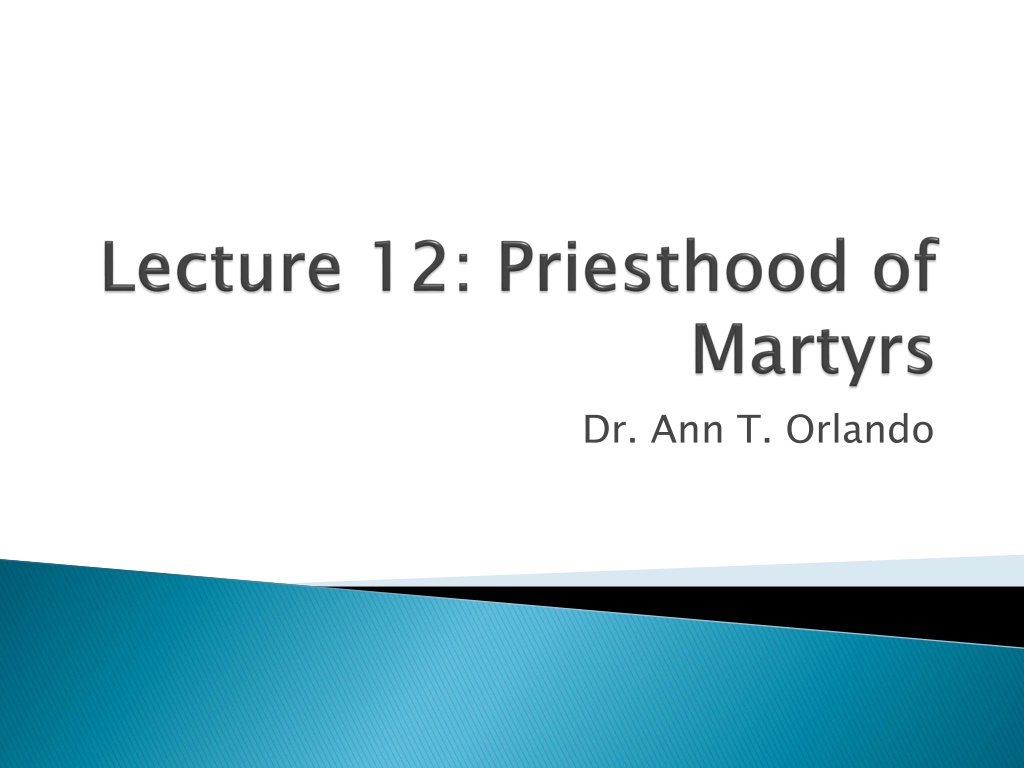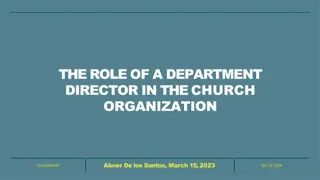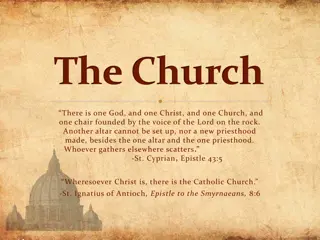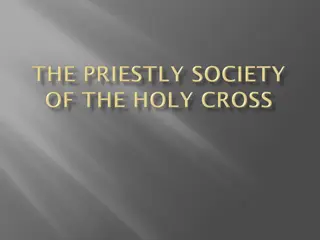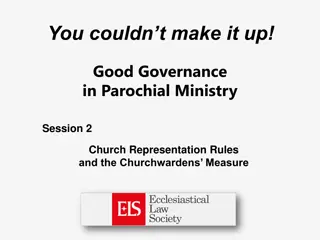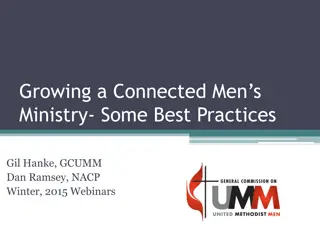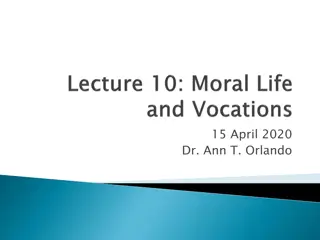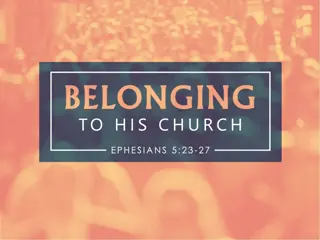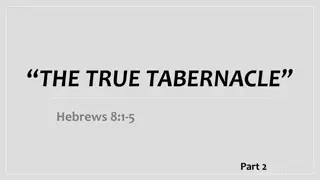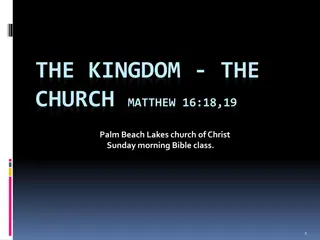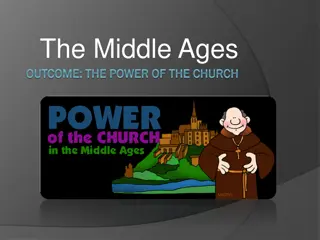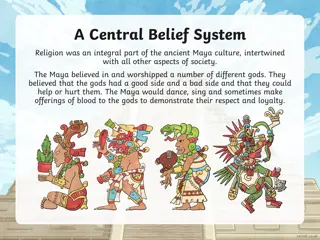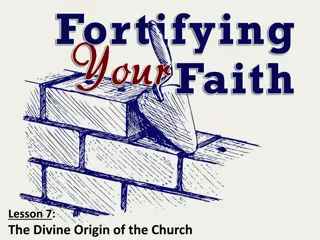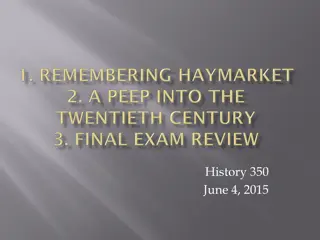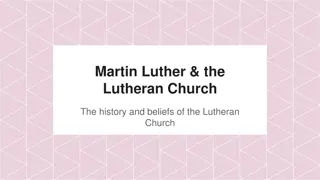Understanding the Priestly Role of Martyrs in Church History
Exploring the scriptural foundations and historical examples of martyrs as priests in the early Church, with a focus on figures like Abel, Polycarp, and the heroic witness of martyrs in imitating Christ's sacrifice. The article delves into the concept of martyrdom as a form of priestly self-sacrifice, drawing parallels between the suffering of martyrs and the Eucharistic references in their acts. Key texts, such as 1 Peter 2:9 and Romans 12:1, are examined alongside insights from Church Fathers like Origen, Ambrose, and Augustine, shedding light on the spiritual authority and significance of martyrdom within the Christian faith.
Download Presentation

Please find below an Image/Link to download the presentation.
The content on the website is provided AS IS for your information and personal use only. It may not be sold, licensed, or shared on other websites without obtaining consent from the author. Download presentation by click this link. If you encounter any issues during the download, it is possible that the publisher has removed the file from their server.
E N D
Presentation Transcript
Scriptural models for martyrs as priests Martyrs following in footsteps of Jesus Martyrs as priests because of their sacrifice Spiritual authority (or not) of martyrs
Abel is seen as the initiator of martyrdom because of his acceptable sacrifice (Cyprian Letter 58 (55)) Recall from reading of Ambrose On Cain and Abel as well as Augustine in City of God Importance of right sacrifice Abel as proto-priest and martyr
Key texts are 1 Peter 2:9 and Pauls Letter to Romans 12:1 Recall from Origen reading Leviticus (Homilies on Leviticus 1:5) in the light of Paul: The priest, and his sons, is in you the mind which is also its understanding in you who are rightly called a priest and sons of a priest for they are the only ones who perceive God and are capable of the knowledge of God. Therefore the divine Word desires that you offer your flesh to God in purity with reasonable understanding, as the Apostle says, A living offering holy and pleasing to God, your reasonable service. (Rom 12:1) Story in Acts of first martyr: Stephen Revelation describes how martyrs will attain the ultimate victory because they were sealed with the mark of the Lamb and imitated his suffering by washing their robes in the blood of the Lamb (see Rev Ch 7)
The heroic witness unto death formed the fundamental way in which the Church understood herself The sacrifice of the martyrs was often written in imitation of Jesus passion and death And since sacrifice is the definitive priestly act, so martyrs by their self-sacrifice are priests But acts of the martyrs often filled with Eucharistic references, thus emphasizing their priestly sacrifice See especially Martyrdom of Polycarp
Polycarp probably martyred c. 170 in Asia Minor The story of his martyrdom is a letter from Smyrna to other Christian Churches Note especially parallels to Jesus trial and crucifixion
Recounts martyrdom of a group of young Christians c 203 Some parts of story written by Perpetua while in prison Tertullian may have been the editor Significant scholarly debate concerning language of origin: Greek or Latin Significant Scholarly debate on whether or not it is a Montanist document Note how the direct action of the Holy Spirit guides and sanctifies Perpetua and her companions Note that their sacrifice is given equal status to Scripture
Believed in continuing Prophecy in Church through the action of Holy Spirit Both men and women Prophecy took the form of ecstatic utterances and actions; equal in value to Scripture Encouraged excessive disciplinary practices Opposed remarriage after death of spouse Encouraged active seeking of martyrdom That is, voluntary martyrdom Once a person was Baptized, and then sinned, they could not be forgiven
Bishops actively discouraged Christians from volunteering as martyrs If accused, then Christians should not renounce the faith, but should not flaunt it for purpose of being martyred This would be suicide, not in accordance with God s will Neither should Christians take up arms to defend themselves There is no recorded instance of any Christian rising in armed rebellion against the Romans In distinction to earlier Judaism or later Islam (or later Christianity) See, for example, Clement of Alexandria, Stromata IV.10 9
Recall that did not have to die to be a martyr Suffer for the sake of The Name Martyrs in life and death were considered heroes of the Church with great personal spiritual power Should the Church encourage martyrdom? Official stance by most bishops was not to actively seek it, but if pushed, not to deny the faith What was authority of martyrs? Could they forgive sins Tertullian, North African Christianity 10
Presumed to be written by Hippolytus c 250 in Rome Written in Greek Like the Apostolic Constitutions records various liturgies A confessor who has suffer can be ordained a presbyter without having hands laid on his head
Cyprian very much honored martyrs (CUA Letter 58) But concerned about martyrs giving out certificates to the lapsed (CUA Letter 27) Seemed to undermine authority of bishops
Wrote over 100 sermons on birthday of the martyrs Not uncommon Reread CoG X.20-21 Note X.20 is the sacrifice of Christ and the Eucharist, followed immediately by a discussion of the sacrifice of the martyrs in X.21 Out of deference to Cyprian, Augustine does not call the martyrs heroes, But he does say If it were not contrary to the usage of the Church, we might call those martyrs heroes. (X.21)
Martyrdom of Polycarp Passion of Perpetua Selection from Apostolic Tradition Cyprian, Letters 27 and 58 Augustine, CoG, X.20-21
